Cross-promotion in Candy Crush Soda Saga
Eric Seufert, Wooga’s lead marketer, shared his thoughts on Candy Crush Soda Saga: what the game has achieved since its release, why King needs it, and why the British have returned to cross-promotion in their projects.
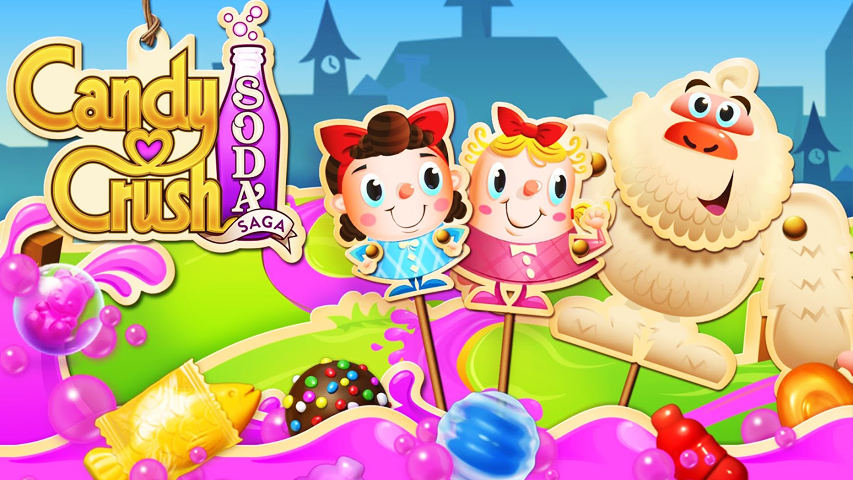
The original version of the material can be found on Mobile Dev Memo, a website dedicated to the mobile industry, run by Eric Seferth himself, author of the book Freemium Economics.
On Tuesday, November 11, King Limited launched its latest mobile match-3 game, Candy Crush Soda Saga (CCSS) worldwide. The game reached the top of the charts almost instantly. She received the first place in the Top of free downloads in the iPhone App Store the very next day after the release. All this happened largely thanks to a massive advertising campaign that included public events in New York and London, aggressive Facebook advertising that reached 100 million people in 7 countries on the first day, television advertising that is shown up to Christmas in 20 countries, and outdoor advertising in several cities.
CCSS converted all this into significant box office receipts: on December 8, the game was in the box office Top 5 in the iPhone App Store in 46 countries, including the USA, and in the box office Top 5 on Google Play in 21 countries, also including the States.
The value of King on the stock exchange began to gradually increase since the release of CCSS, increasing by 21% from November 11 to $16.76 on December 8.
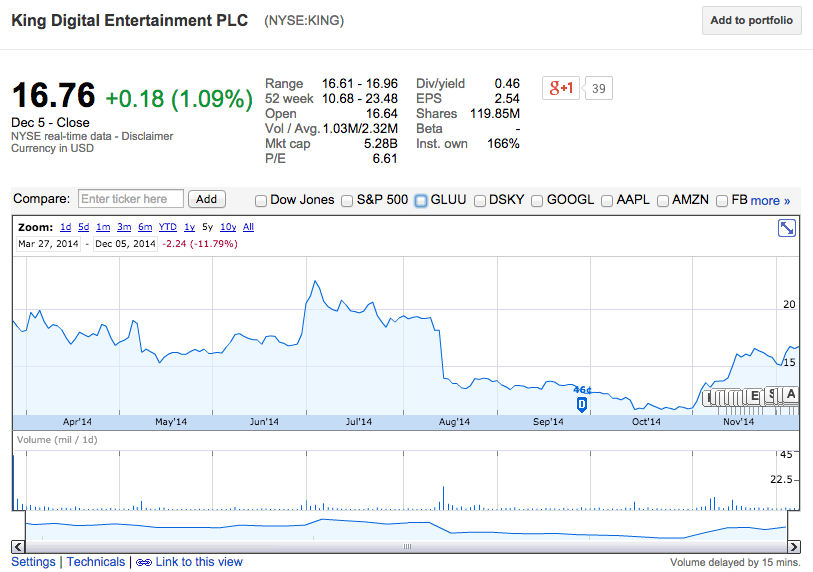
The launch of CCSS is an important milestone in the company’s history: previously, King proved that it can earn money from games not from the Candy Crush universe: Farm Heroes Saga, Bubble Witch 2 Saga, Pet Rescue Saga now occupy 12th, 21st and 24th place in the cash iPhone App Store US, respectively (as of December 8).
By doing this, King has partially dampened fears that its revenues are entirely dependent on Candy Crush Saga, which has occupied top box office positions in the App Store and Google Play since its release in 2012. When the company went public in March 2014, Candy Crush was responsible for 78% of the company’s revenue, but according to the latest reports in early November, this number has now dropped to 51%.
But after going public, King has yet to create another global megahit comparable in success to Candy Crush, which is most likely the reason why the price of one of the company’s shares only slightly exceeded the debut $19.
King is almost a victim of the high bar set by Candy Crush Saga: by almost any standard, many games from the company’s portfolio are hits. Despite this, King’s revenues have fallen over the past year: the company reported a drop in both order volumes (gross booking) by 16% and adjusted EBITDA (by 26%) in its latest public report. But at the same time, the company has increased its user base: in the same report, King reported an increase in DAU by 26% and MAU by 37%; the company’s savings amounted to approximately $ 1 billion.
At first glance, CCSS may look like an attempt by King to use the Candy Crush brand for promotion, hoping to convince investors of the company’s ability to create games in the global box office Top 5 on a planned basis. It also looks like an opportunity to increase the life cycle of the brand, re-attract already departed Candy Crush users with new content and retain veterans by transferring them to their new game, rather than the game of competitors (Supercell tried to do something similar by releasing Boom Beach).
Undoubtedly, King does all this all this is fair to CCSS, but it also does something else, namely, it carries out aggressive cross-promotion of non-paying players in other games with the help of frequent and aggressive advertising.
Facebook Facebook connection I have passed the first world in CCSS three times: the first time as a non-paying player without connecting to Facebook, the second time as a non-paying player with a Facebook connection, the third time as a paying player without connecting to Facebook.
Regardless of whether I was connected to Facebook or not, I was shown ads at level 12. The first advertisement I saw was shown to me after I ran out of lives – it was a full-screen banner advertising Diamong Digger Saga, which is now at 42 positions in the box office top in the USA.
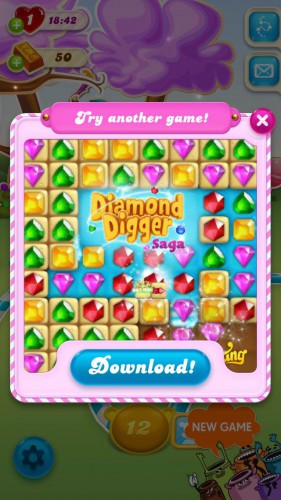
After it was closed, a ”New Game” icon appeared in the lower right corner, when I clicked on it, I was shown a full-screen banner of another game – Papa Pear Saga, which now ranks 158th in the iPhone App Store US box office top.
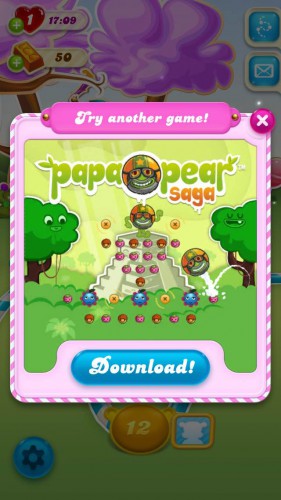
After the display, the “New Game” icon did not disappear. Curiously, even after making a payment (without connecting to Facebook) in the first world, I was still shown banners.
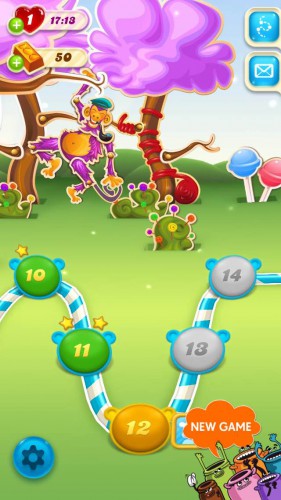
After passing the first world as a non-paying player (and a late payer after the start of the cross-advertising campaign), I reset the IDFA, reinstalled the game and made a payment (10 gold bars for $0.99) after completing the first level. After that, no ads were shown to me throughout the first world.
Level 12 can be reached in 30-45 minutes of the game, by the third passage of the first world I could do it in one session (without waiting for the recovery of 5 hearts and refil). Such an aggressive cross-advertising strategy – to reach non-paying players during the first hour of the game and, possibly, the first session – opens up a new dimension of King’s CCSS strategy: to use the attraction of the Candy Crush franchise to boost the user base of other (even much less successful) games.
With the success of CCSS, King can not only prove that it is capable of creating extremely successful games (albeit after generous marketing spending on user purchases and brand promotion), but can also diversify its own user base – and revenue – through systematic cross-advertising and revenue distribution. It is also worth mentioning that King announced its rejection of cross-advertising in mid-2013, but now aggressive tactics in terms of cross-promotion indicate that the company is targeting it in the long term.